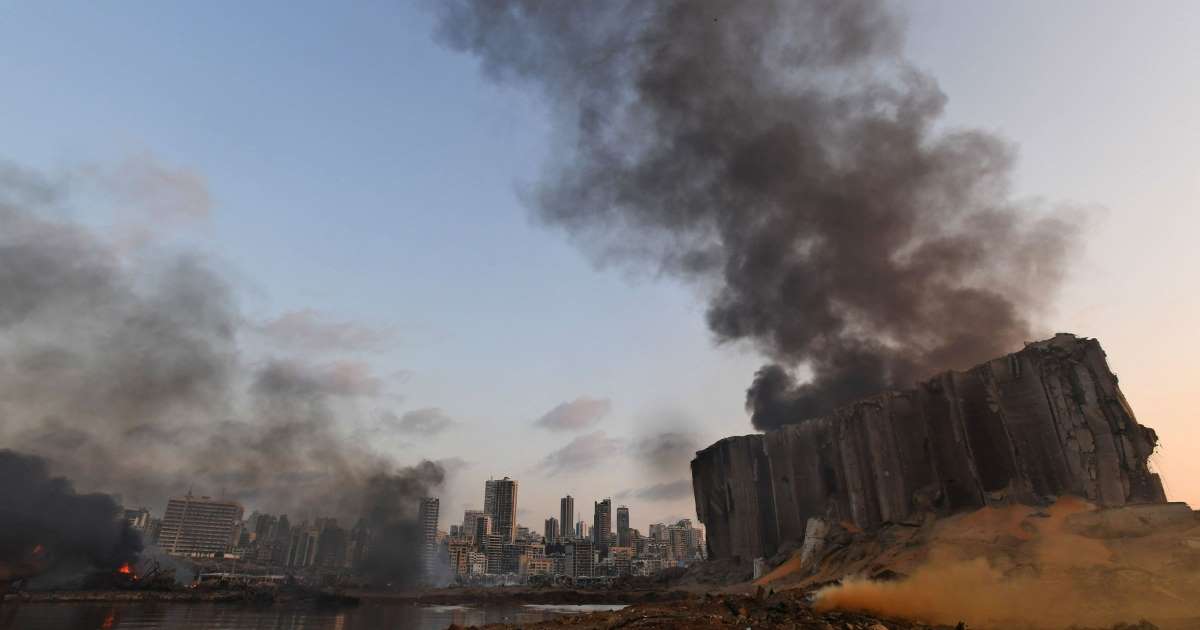© AFP / Magazine image
The Finnish professor estimates that the partial destruction of an important import port will increase tensions in Beirut. LEHTIKUvA / AFP
The big explosion in Beirut is likely to further increase the deep political tensions in Lebanon, says Professor Hannu Juusola from the University of Helsinki. Even though it is an accident, different parties blame each other for what happened, he predicts.
At the same time, the hostility of ordinary citizens towards political leadership is likely to increase.
– The accident is considered a sign of extreme cynicism and indifference to people, Juusola says.
Another factor that increases tensions is the partial destruction of an important import port, which, according to Juusola, could raise food and fuel prices, among other things. It further complicates the lives of citizens in a country plagued by hyperinflation and the economic crisis.
According to Juusola, economic discipline has hit almost all Lebanese, and extensively the middle class as well.
– So far, only the most prosperous class has survived, he says.
Juusola does not consider it very likely that a common hard ordeal would bring the Lebanese political groups to cooperation – unless pressure comes from outside the country after the first phase of emergency aid.
– It would be very important that this would increase the desire of the international community to help and uniformly put pressure (on the Lebanese leadership) on reforms that could help the country get to its feet, Juusola says.
“Either we were at the bottom?”
According to Taavi Sundell, who works at the Finnish Institute in the Middle East in Beirut, the past year has already been shocking for Lebanon due to the economic collapse and the corona epidemic.
– There was a conversation with the landlady downstairs in the morning that someone would have gotten to the bottom, and there would be no more than one direction up from this, Sundell says.
– On the other hand, this has been thought of many times before and it always surprises that it can go even worse, he continues.
A possible “silver fringe” of the explosion, he said, could be that the world’s attention will now turn to Lebanon for at least a few days. In a good case, this could lead to the country receiving other aid that it would have needed in the past, for example to deal with the corona crisis.
Sundell, on the other hand, sees no signs of the political reforms that are a prerequisite for the opening of international loan taps.
– There has been a really discouraged atmosphere here for a long time. To put it bluntly, everyone who can, wants to leave the country, he describes.
Little Lebanon has already had to take in about 1.5 million refugees from war-torn Syria.
“Maybe it’s a group whose position isn’t getting any worse because it’s so shockingly bad already,” Sundell ponders.
There is also a desire to help
According to Kaisa Rouvinen, Regional Representative of the Finnish Red Cross in the Middle East, there are hospitals and qualified staff in Lebanon. However, the scale of the damage caused by the explosion is such that hospital beds, for example, are not enough.
– It is also clear that the treatment of the corona epidemic has already stretched resources quite far, Rouvinen says.
According to him, the Lebanese Red Cross has already done a good job in emergency treatment of the accident. Among other things, the organization moved all its ambulances from the rest of the country to Beirut to handle ambulance services.
Rouvinen estimates that in the first phase, there will be a great need in Beirut for, among other things, temporary accommodation after the apartments are destroyed. On the other hand, when in the Middle East, family and relatives play an important role in helping, he said.
– Despite everything, I believe that there is a drive to help each other and each other to help each other. Politics is always politics, but people work together terribly well and society is not as decentralized as it may seem from the outside, Rouvinen estimates.
The hardships of a small country
Lebanon, which is small in size and population, has experienced its history quite hard in many ways. In 1975-90 the country was ravaged by a long and bloody civil war. During the war in the 1980s, arch-enemy Israeli forces invaded all the way to Beirut.
Syrian troops from another neighboring country, deeply involved in Lebanon’s affairs for a long time, finally withdrew in 2005. Since then, some 1.5 million refugees have fled Syria to Lebanon, with a population of less than five million. Hezbollah, which also has an influence in the Lebanese government, is strongly supported by Iran.
The older cancellation of Syrian refugees is the Palestinians who fled Lebanon from what is now Israel.
Building patterns of political cooperation has been a delicate and difficult balancing act in the country of several religions. Under the traditional arrangement, the Lebanese president is a Christian, the prime minister a Sunni Muslim, and the Speaker of Parliament comes from Shiite Muslims.
Last autumn, widespread unrest broke out in Lebanon against the country’s political leadership. The country, in the midst of the worst economic crisis in decades, announced in March that it would suspend repaying its debts.
No solution to this situation has been found in negotiations with the International Monetary Fund. The value of the Lebanese currency, the lira, has plummeted and a large proportion of the country’s population lives both below the poverty line and out of work.
